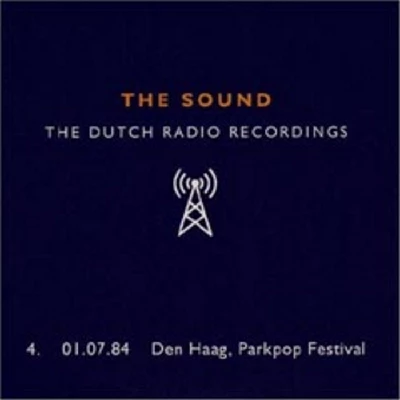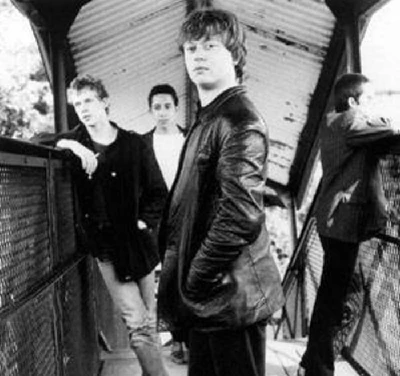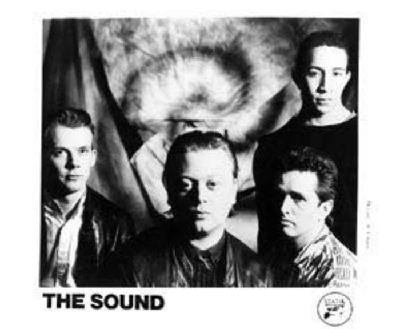Sound
-
Dutch Radio Recordings
published: 26 /
8 /
2006

80's London-based new wave group the Sound were always massively popular in the Netherlands. John Clarkson examines the band's tragic legacy, and their Dutch Radio Recordings of 5 momentous Sound concerts, which have been released consecutively
Article
Although they released six albums in their lifetime, the Sound, who formed in early 1979 and broke up in late 1987, were under valued in their own country, always attracting only a small audience. 200 miles away from their native South London and across the North Sea in the Netherlands, the Sound, however, had a fanatical following, regularly filling out 2000 capacity venues and at one point in the early 80’s outselling both U2 and Echo and the Bunnymen there.
The Sound’s fiery, anthemic sound and singer Adrian Borland’s impassioned, hoarsened vocals always made them at their best as a live rather than a studio act. It is, therefore, fitting that the London-based label Renascent, in the latest in their long series of Sound reissues, should choose to release consecutively five live albums, each recorded for Dutch radio at a different gig in the Netherlands and capturing the band at a pivotal point in their career.
The first of these CDs was recorded at the Amsterdam Paradiso on the 8th March 1981 on the last night of the band’s four-date first Dutch tour. The Sound had already released to much critical acclaim their first LP ‘Jeopardy’ (1980), and, with their second, ‘From a Lion’s Mouth’ (1981) forthcoming, it seemed that they were destined for great things. The Sound’s original keyboardist Benita ‘Bi’ Marshall had left the band in December 1980. After a brief period working as a three piece, the group’s remaining members, Borland (vocals, guitars), Graham Bailey (bass guitar), and Mike Dudley (drums), had recruited in February 1981 Colvin ‘Max’ Mayers into the line-up in her place, and this first Amsterdam show was one of his first gigs with the Sound. The Paradiso would become the Sound’s ‘home from home’ and regular venue outside London. They would go on to play there another nine times in the next six years before they split up.
The second CD was recorded just over a year later on the 9th April 1982 at a No Nukes Festival in Utrecht. One of the Sound’s first stadium dates, it was the band’s own favourite out of all their gigs. It concluded with fans, undoubtedly to the horror of the promoters, setting fire to their ‘No Nukes’ posters in the stadium after an alcohol-buzzed Borland, during a feedback-strewn version of set closer and audience favourite ‘Missiles’ convinced the crowd that, while nuclear weapons were a force for evil, nuclear power in comparison was of benefit to mankind and for the good.
The third CD was recorded on the 24th January 1983 in the Stokivshal, a venue in Arnhem. In the nine months between that gig and the No Nukes Festival, at which major success had still seen imminent, the Sound’s fortunes had spiralled swiftly downwards. They had released their third album ‘All Fall Down’ in October 1982. A harsh and experimental electro record, it had little of the potential commercial appeal of its more brassy two predecessors and the band quickly found themselves dropped by their label Warners Brothers’ offshoot Korova, with whom they also had released ‘Jeopardy’ and ‘From a Lion’s Mouth’, as a result. Surviving by touring Europe extensively while they looked for another deal, the Stokishval show was recorded in the midst, of what Mike Dudley terms in the wryly, witty sleeve notes that accompany the CDs, as “our 40 days and nights in the desert.”
By the time of the fourth CD, which was recorded 18 months later at an annual festival, the Parkpop, in the Hague on the 1st July 1984, the band were playing with renewed hope. With their major label days at an end, they had signed to Statik, a medium-sized independent label, and had just released a six song EP, ‘Shock of Daylight’, their first new recordings in two years.
A fourth album, ‘Heads and Hearts’, would follow in early 1985. The fifth and final CD was recorded at the Vrije Vloer, a venue in Utrecht, on the 9th of April that year on a tour to promote that album. The band’s penultimate extensive Dutch tour, it features the late Ian Nelson (who died aged 50 in April from heart failure) who had played on ‘Heads and Hearts’ and, whose regular band Fiat Lux had just broken up, guesting on saxophone.
After that brief period of regenerated optimism with Statik, the Sound’s fortunes, however, continued to wane. A fifth album, ‘In the Hothouse’, recorded over the course of two nights in August 1985 at the London Marquee, came out in early 1986, but Statik shortly afterwards went into liquidation and by the end of that year the Sound had lost that deal too.
Adrian Borland had also begun to suffer from mental illness and was diagnosed as suffering from manic depression. The group released a sixth album, ‘Thunder Up’ (1987) on the then tiny Belgian label Play It Again Sam. A European tour to promote it in November 1987, however, ended in disaster when Borland had a breakdown at the first date in Vitoria in Spain and all the other dates of the tour had to be cancelled. Mike Dudley decided to leave the band shortly afterwards and the group, after briefly trying to carry on with him, broke a up few weeks later.
Borland began a solo career and recorded five low-key albums, but continued to be plagued by mental illness. Over the course of the next few years he would hear voices and try to commit suicide several times. As he put the finishing touches to his last album ‘Harmony and Destruction’, Borland began to show symptoms of illness again. He died on the early morning of April 26th 1999 after throwing himself in front of a train at Wimbledon Station. He was 41.
With Mayers, who died from an Aids-related illness on Boxing Day 1993, also having gone, and Bailey, who now lives in America, and Dudley both being long retired from making music, 'The Dutch Radio Recordings' serve as a wonderful reminder, almost 20 years on from the Sound’s final dissolution, of how forceful a live act and how strong a band they were.
With over five hours of music, 'The Dutch Radio Recordings' might seem a daunting proposition to all but the most ardent of Sound fans. Indeed there is an inevitable certain level of repetition. 'Winning', which appeared on 'From a Lion's Mouth' and was a staple of their live shows almost from the beginning, is on all five CDs. 'Heartland', another early favourite from 'Jeopardy', is present four times, while other crowd pleasers 'New Dark Age', the closing number on 'From a Lion's Mouth'; 'Party of the Mind', one of the more accessible tracks from 'All Fall Down', and ‘Missiles’, all appear on three of the CDs.
'The Dutch Radio Recordings', however, also provides a fascinating historical insight into the development of the Sound. At the early Amsterdam show, with Max Mayers having joined the Sound just a few weeks before, the group, while showing great early energetic promise, sound raw and scratchy. With only a small repertoire of songs, when called back for a surprise encore at the end of their 45 minute set, they are forced to bang their way through 'Hey Day' for a second time. By the time of the second CD at the No Nukes Festival 13 months later, they are, although the drunken Borland's voice drifts in and out of tune, a much more polished act , brief contenders for U2's eventual crown, upon whom ironically the Sound were an acknowledged influence, as anthemic political agitators.
The third Arnhem CD sees them, despite having just lost the Korova deal, putting on a surprisingly defiant show, down perhaps, but certainly not out, while the last two CDs, both recorded during the period of their second chance at fame with Statik, shows a vibrant , dynamic group at the height of its powers. The last CD, recorded with Nelson, could be seen as a ‘Best of’ CD. It contains all the Sound's classic songs , opening with ‘Golden Soldiers’, the stand-out track from ‘Heads and Hearts’ ; featuring mid set ‘Winning’, ‘Burning Part of Me’ and ‘Whirlpool’ from the first two albums, and concluding with ‘Missiles’ and “Party of the Mind’.
‘The Dutch Radio Recordings’ have more of a sense of bootleg to them than ‘In the Hothouse’. Applause shifts in and out of the songs, and there are no cuts in the often two or three minute gaps between the band leaving the stage after their main set and then returning for an encore. More too is subsequently revealed about Adrian Borland’s character as a result than on any other recordings.
He comes across a churlish, often bolshy figure. A critic who wrote off the band after they were dropped by Korova incurs withering scorn as Borland introduces ‘The Fire’ at the Parkpop Festival (“This is for whoever is the idiot that wrote that the Sound ‘has lost their Holy Fire.’ Don’t write about what you don’t understand. DON”T WRITE !”). Fellow singer Jim Kerr, then playing stadiums with his band Simple Minds, is less subtly dismissed a few moments later on the same recording (“Fuck off, Jim Kerr !”). An over enthusiastic and ultimately hapless security guard at the No Nukes gig also gets Borland’s wrath on the second CD (“I couldn’t even get on stage tonight because some asshole said you haven’t got a pass. I haven’t got a fucking pass.”)
Yet, for all his grumpiness and belligerence, Borland also comes across on these five CDs as a remarkably committed performer, one not afraid to go against the common herd as the No Nukes gig reveals, and as the third concert in Arnhem shows, having just suffered the humiliation of having lost his major record deal, still trying to rally his band onto new heights. At the final Utrecht gig he is meanwhile suffering from dreadful flu, but, with the lyrics of the just released 'Heads and Hearts' already pointing towards the mental illness that just a few short months later would begin to take its terrible toll on him, feistily still manages to pull off one of the highlight gigs of his career.
With the possible exception of the final Utrecht 'Greatest Hits' show, 'The Dutch Radio Recordings', all of which are available at budget price, will perhaps be best appreciated by Sound enthusiasts and already committed fans. These nevertheless are outstanding releases. Live releases, all too often simply means for bands to fulfill multi-album contracts, or a cheap way of extracting more money from fans, rarely comes across as passionate and revelatory as these five recordings. They are the perfect testament to one of Britain's most unheralded and best live bands.
Band Links:-
http://www.brittlehaven.com
Picture Gallery:-


